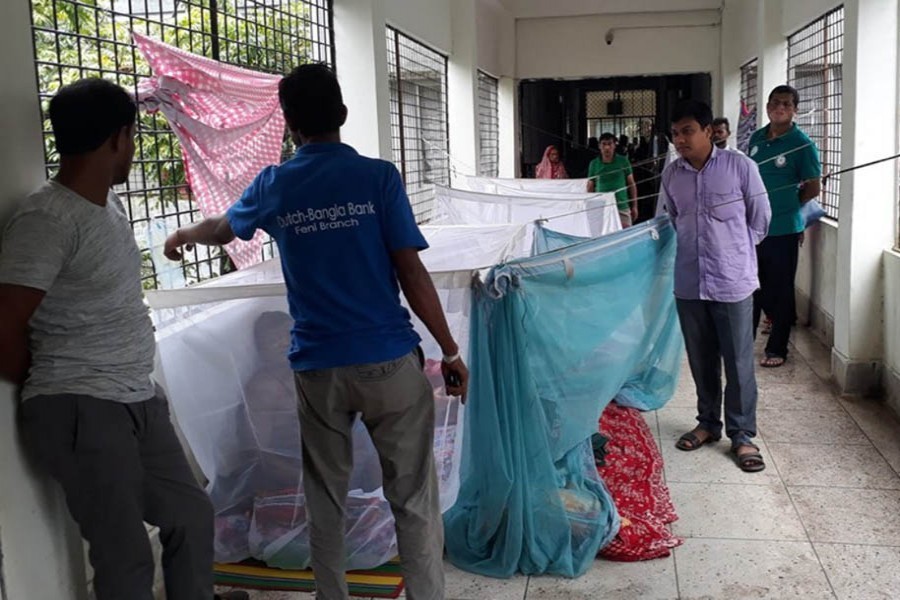While ravaging Dhaka in the last 18 years, especially in 2016, the intensity of dengue outbreak has seen periods of respite as well. It emerged again this year, with apparently indomitable ferocity. Its declining trend in the last few years prompted the residents of Dhaka to heave a sigh of relief. Except isolated cases, the earlier intensity of dengue outbreak started waning in the recent years. This year's return of the dreaded disease with vengeance has jolted both the common man and the authorities of the two city corporations out of their complacence. According to many health experts, if allowed to wreak havoc with public health with few preventive actions, dengue fever might soon become endemic to Dhaka. The feared development may have a lot to do with the slipshod approach of the authorities concerned towards dealing with the disease, which periodically turns fatal.
The first official detection of the debilitating capabilities of dengue was made in the year of 2000. Thanks to the city's unwieldy expansion, the residents' reckless lifestyle coupled with their habitual indifference to preventive steps, the disease now finds an ideal space for incubation in vulnerable patients in this capital. The two city corporations being hamstrung by fund and other shortages add to the woes stemming from the scourge. The potently grim reality is the dengue patients continue to rise. A data from the Directorate General of Health Services (DGHS) has found that the number of people infected with dengue fever this year has already crossed 10 and half thousand. They include patients stricken with the disease outside Dhaka.
Of the total number of patients, the largest got admitted to government hospitals in Dhaka. Some go to the private ones finding no beds or cabins at state-run hospitals. Due to being 'free of cost', the general patients normally rush to government hospitals. As feared always, the problem of bed crunches during these crises crops up in no time. Acute dearth of doctors and nurses follows suit. The general picture in all of Dhaka's large hospitals is similar at the moment: lots of patients of all ages including children lying on the hospital floor. Apart from it, there are insufficient facilities for blood and platelet count tests. What is most worrying is amid this widespread confusion, deaths of haemorrhagic dengue patients continue to occur. In spite of being spacious and better equipped and staffed, with the number of patient admissions increasing unabatedly, the reputed government hospitals are found baffled. Similar is the case with many patients' attendants. At a point of desperation, they find few options open except admitting their patients to costly private hospitals.
The overall situation would not have deteriorated to this pitiable state. According to urban experts, the authorities seem to have been belittling the problem since it erupted initially two decades back. Had they been proactive and swung into all-out preventive actions, the dengue would not have gained this frightening strength. What's painful is the two Dhaka City Corporations, previously one undivided entity, knew full well the extent of havoc dengue can play with Dhaka. Apart from floating public adverts on the people's duties and responsibilities in fending off dengue during monsoon, they have been seen doing little in battling the disease. Yes, in the rainy season the corporation people are seen spraying Aedes mosquito repellent from fogger missions in the afternoons. They haven't worked. Now it's heard that the sprays were ineffective. Meanwhile, pools and puddles of stagnant rain water fill the whole capital, especially its older part. It's ironical that whereas the average educated people are now aware of how the dengue virus spreads, the corporation authorities appear to feign being bewildered. That stagnant rain water remains in place for days throughout the capital is totally unacceptable.
The culprit behind dengue is Aedes Aegypti, a mosquito which grows in clean water collecting in puddles and throwaway containers. This phenomenon begins with the start of summer rain-storms in April and lasts till the end of monsoon in August-September. Due to its prolonged stay, it remains more or less a potential health threat. Given this protracted prevalence of Aedes vector and dengue attacks, Dhaka is feared to emerge as synonymous with dengue, like Yellow Fever with some South American and African countries.
This year's intensity of the dengue ravages after a tolerable gap is filled with distressing and ominous thoughts. The dominant of them is Dhaka's feared entry into the list of a few South and Southeast Asian cities where dengue has been endemic for long. Of them, Delhi has allegedly earned the infamy of being one of the oldest dengue-endemic cities. In spite of being quite an old urban centre, Dhaka, luckily, remained free of the incessant dengue assaults. It has been since the late twentieth century, with city growing fast, that dengue outbreaks began occurring in isolated cases. This assumed a dreadful shape in the year of 2000. That dengue is largely city-centred had long been proved. It is the shabbily maintained cities inhabited by citizens least bothered about keeping their surroundings clean and free of the dengue vectors are found to be chronically assailed by this infectious disease. The disease is spread by the bites of dengue virus-carrying mosquitoes. Outwardly, the ailment is a 'bone-crushing' painful fever. Normally, it lasts for ten to fifteen days. But its haemorrhagic strain afflicts the patients with lots of complications which may lead to death.
In spite of vigorous media and other anti-dengue campaigns for years after the first series of its severe onslaughts, few years have passed off as completely free of dengue attacks. Many dengue cases, however, remain unreported. In a situation like this, the large outbreaks of the disease last year and also this year are considered replete with elements of deep anxieties.


